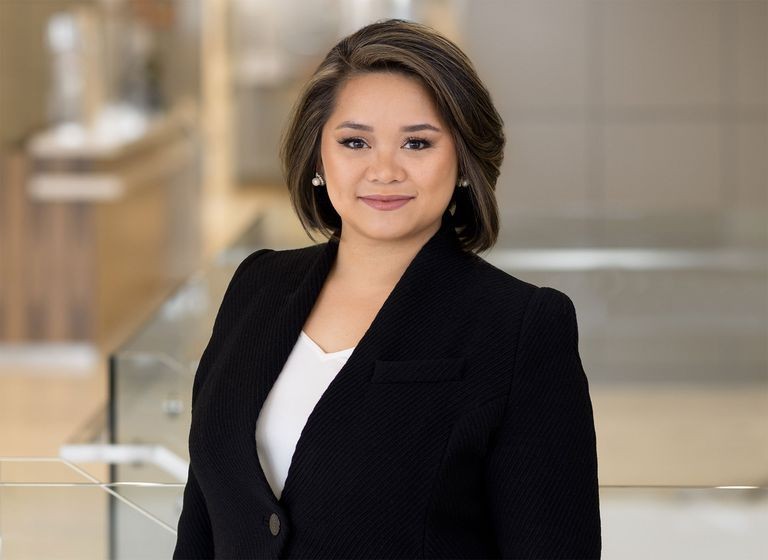Garylene (Gage) Javier
Overview
Gage Javier (CIPP/US) is a counsel in the Washington, D.C. office of Crowell & Moring and a member of the Privacy and Cybersecurity Group, where she practices at the intersection of law, business, and technology. A Certified Information Privacy Professional (CIPP/US) with a business and scientific background, she provides strategic legal and business solutions for sophisticated entities, including tech and government contracts clients, in matters associated with incident response, privacy and cybersecurity regulatory compliance, and technology-related litigation.
Career & Education
- District of Columbia
Civil Litigation Law Clerk, Office of the Attorney General, 2013 - Department of Justice
Law Clerk, Office of General Counsel, U.S. National Central Bureau – INTERPOL Washington, 2011
- District of Columbia
- Cornell University, M.B.A., 2016
- Queen's University, M.B.A., 2016
- American University Washington College of Law, LL.M., intellectual property and criminal law (computer crimes focus), 2014
- Appalachian School of Law, J.D., 2012
Natural Resources Law Journal: associate editor - University of California, Los Angeles, B.S., microbiology, immunology, molecular genetics, 2004
- District of Columbia
- U.S. Court of Federal Claims
Garylene (Gage)'s Insights
Client Alert | 8 min read | 06.30.25
AI Companies Prevail in Path-Breaking Decisions on Fair Use
Last week, artificial intelligence companies won two significant copyright infringement lawsuits brought by copyright holders, marking an important milestone in the development of the law around AI. These decisions – Bartz v. Anthropic and Kadrey v. Meta (decided on June 23 and 25, 2025, respectively), along with a February 2025 decision in Thomson Reuters v. ROSS Intelligence – suggest that AI companies have plausible defenses to the intellectual property claims that have dogged them since generative AI technologies became widely available several years ago. Whether AI companies can, in all cases, successfully assert that their use of copyrighted content is “fair” will depend on their circumstances and further development of the law by the courts and Congress.
Speaking Engagement | 05.14.25
Speaking Engagement | 04.30.25
"Guardians of the Cyber Galaxy: Allies Against AI-Powered Cybercrime," RSAC Conference
Representative Matters
- Representing Microsoft in carrying out various actions disabling IP addresses and domain controlled by malicious million-computer botnets responsible for global spam distribution.
- Counseling a technology company trusted by Fortune 500 companies and global non-profit entities on a ransomware incident and engage a forensic expert to conduct a privileged forensic investigation.
- Advising a multinational electronics company on privacy and cybersecurity compliance related to personally identifiable information (PII) and encryption requirements under the National Institute of Standards and Technology (NIST) and Federal Information Processing Standards (FIPS).
- Advising a national construction firm on privacy and incident response policy reviews.
Garylene (Gage)'s Insights
Client Alert | 8 min read | 06.30.25
AI Companies Prevail in Path-Breaking Decisions on Fair Use
Last week, artificial intelligence companies won two significant copyright infringement lawsuits brought by copyright holders, marking an important milestone in the development of the law around AI. These decisions – Bartz v. Anthropic and Kadrey v. Meta (decided on June 23 and 25, 2025, respectively), along with a February 2025 decision in Thomson Reuters v. ROSS Intelligence – suggest that AI companies have plausible defenses to the intellectual property claims that have dogged them since generative AI technologies became widely available several years ago. Whether AI companies can, in all cases, successfully assert that their use of copyrighted content is “fair” will depend on their circumstances and further development of the law by the courts and Congress.
Speaking Engagement | 05.14.25
Speaking Engagement | 04.30.25
"Guardians of the Cyber Galaxy: Allies Against AI-Powered Cybercrime," RSAC Conference
Recognition
- American Bar Association: Advocate of the Month, 2024
Garylene (Gage)'s Insights
Client Alert | 8 min read | 06.30.25
AI Companies Prevail in Path-Breaking Decisions on Fair Use
Last week, artificial intelligence companies won two significant copyright infringement lawsuits brought by copyright holders, marking an important milestone in the development of the law around AI. These decisions – Bartz v. Anthropic and Kadrey v. Meta (decided on June 23 and 25, 2025, respectively), along with a February 2025 decision in Thomson Reuters v. ROSS Intelligence – suggest that AI companies have plausible defenses to the intellectual property claims that have dogged them since generative AI technologies became widely available several years ago. Whether AI companies can, in all cases, successfully assert that their use of copyrighted content is “fair” will depend on their circumstances and further development of the law by the courts and Congress.
Speaking Engagement | 05.14.25
Speaking Engagement | 04.30.25
"Guardians of the Cyber Galaxy: Allies Against AI-Powered Cybercrime," RSAC Conference
Insights
Artificial Intelligence in the U.S.: Reactions from the Public and Private Sectors
|05.14.24
Privacy and Cybersecurity Outlook: The 2024 Landscape
Privacy and Cybersecurity Considerations for Artificial Intelligence in the Metaverse
|05.24.23
Retail in the Metaverse and Beyond
Survey—Cyberspace Law: State Privacy Law Developments
|02.01.22
The Business Lawyer, ABA Business Law Section, Vol. 77
Differences Between the California Consumer Privacy Act and the California Privacy Rights Act
|11.01.20
Consumer Finance Law Quarterly Report, Vol. 74, No. 4
6 Key Ways the California Privacy Rights Act of 2020 Would Revise the CCPA
|09.25.20
Corporate Compliance Insights
Data Privacy Fundamentals in the Age of AI
|08.06.24
The Ethical and Regulatory Impacts of Using Your Data to Train AI
|02.01.24
Businesses Should Consider Legal Risks of Artificial Intelligence, Alumna Says
|05.01.24
Cornell SC Johnson College Of Business
Practice Area Insights — Understanding and Planning for Cybersecurity Incident Response
|12.17.22
Business Law Today
Impacts of the National Cybersecurity Strategy on Government and Private Sector Collaboration
|06.15.23
Crowell & Moring’s Data Law Insights
A Statute of Limitations for BIPA Claims? We May be One Step Closer
|01.30.22
Crowell & Moring’s Data Law Insights
Garylene (Gage)'s Insights
Client Alert | 8 min read | 06.30.25
AI Companies Prevail in Path-Breaking Decisions on Fair Use
Last week, artificial intelligence companies won two significant copyright infringement lawsuits brought by copyright holders, marking an important milestone in the development of the law around AI. These decisions – Bartz v. Anthropic and Kadrey v. Meta (decided on June 23 and 25, 2025, respectively), along with a February 2025 decision in Thomson Reuters v. ROSS Intelligence – suggest that AI companies have plausible defenses to the intellectual property claims that have dogged them since generative AI technologies became widely available several years ago. Whether AI companies can, in all cases, successfully assert that their use of copyrighted content is “fair” will depend on their circumstances and further development of the law by the courts and Congress.
Speaking Engagement | 05.14.25
Speaking Engagement | 04.30.25
"Guardians of the Cyber Galaxy: Allies Against AI-Powered Cybercrime," RSAC Conference






